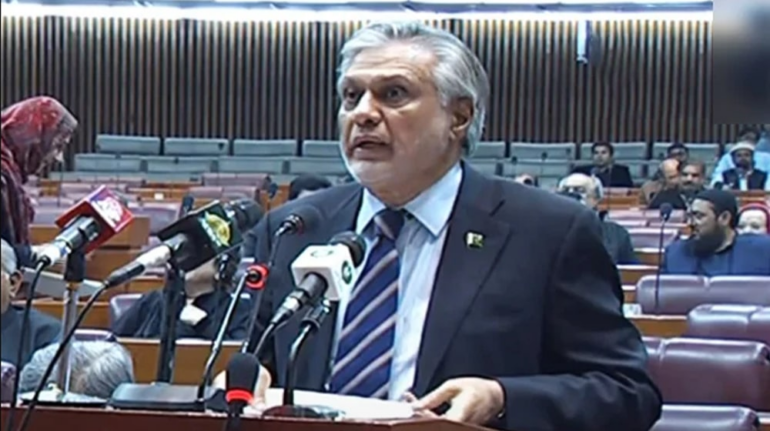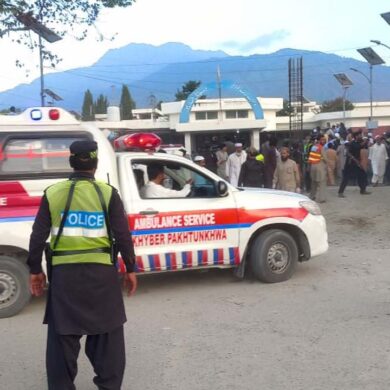Minister for Finance and Revenue Muhammad Ishaq Dar unveiled the Federal Budget of Rs 14.46 trillion for the next fiscal year with mega bundles and no new taxes but targeting “modest real GDP growth rate of 3.5 per cent.
It was unveiled at a session of the National Assembly which was attended by the parliamentarians in a large number perhaps this time so calm, otherwise seldom any budget this country has witnessed without ruckus.
Minister Ishaq Dar acknowledged the existing challenges faced by the economy but emphasized that the government had set the right path for progress. Despite it being an election year, the budget presented was responsible and balanced, focusing on the country’s economic scenario rather than being overly populist.
The estimated total expenses for the upcoming fiscal year are set at Rs 14.46 trillion. Notably, Rs 7.3 trillion will be allocated for interest payments. The projected budget deficit stands at 6.54 percent, with a primary balance surplus of 0.4 percent relative to the gross domestic product (GDP).
For the next fiscal year, the Federal Board of Revenue (FBR) has been assigned a tax collection target of Rs 9.2 trillion, including a provincial share of Rs 5.276 trillion. The federal non-tax revenues are projected to reach Rs 2.963 trillion, while the total income of the Federal Government is expected to be Rs 6.887 billion.
A significant portion of the budget, Rs 950 billion, has been allocated for development projects under the Public Sector Development Programme (PSDP) 2023-24. Additionally, an extra Rs 200 billion will be managed through public-private partnerships to support the development budget.
Allocation for defense and civil administration is set at Rs 1.8 trillion and Rs 714 billion, respectively. Furthermore, Rs 761 billion has been earmarked for employee pensions.
To address various sectors, the government has estimated an expenditure of Rs 1.074 trillion for subsidies in electricity, gas, and other areas. Notably, a grant of Rs 1.464 trillion has been assigned for Azad Jammu & Kashmir, merged tribal districts of Khyber Pakhtunkhwa, Higher Education Commission, Benazir Income Support Programme (BISP), Railways, and other sectors.
In an effort to boost agriculture production, the agriculture credit for the upcoming fiscal year will be increased from Rs 1.8 trillion to Rs 2.25 trillion. Additionally, Rs 30 billion will be allocated to convert 50,000 tubewells to solar energy. The budget also includes measures such as tax exemptions on imported quality seeds and saplings, combined harvesters, rice planters, seeders, and dryers. Moreover, Rs 5 billion will be dedicated to providing concessional loans to the agro industry, and agro-based industrial units with an annual turnover of Rs 800 million will enjoy a five-year tax exemption.
Under the Prime Minister’s Youth Business and Agriculture Loan Scheme, the government plans to provide a subsidy of Rs 10 billion.
With the aim of promoting IT exports, the minister announced that a concessional income tax rate of 0.25% would remain applicable until June 30, 2026. Freelancers earning up to $24,000 per year would also be exempt from sales tax registration and filing tax returns, and a simplified single-page income tax return would be introduced for them. Furthermore, IT and IT-enabled service providers would be permitted to import duty-free software and hardware, equivalent to one percent of their total export proceeds. The export limit for these entities has been set at $50,000 per year.
© Sure! Here is the revised version with improved expressions:
In addition, the government announced the establishment of a venture capital fund with an initial investment of Rs 5 billion to provide business resources to IT entrepreneurs.
Furthermore, the sales tax rate for IT services in the Islamabad Capital Territory has been reduced from 15% to 5%, as stated by the minister.
During the upcoming financial year, the government aims to provide professional training to 50,000 IT graduates.
Regarding the Small and Medium Enterprises (SMEs) sector, the finance minister highlighted relief measures such as expanding the turnover threshold under the tax facilitation system from Rs 250 million to Rs 800 million. Additionally, Rs 10 billion has been allocated under the PM’s Youth Loan Programme to provide concessional loans for small businesses.
To support the industry and export sector, the government plans to establish the Export Council of Pakistan, chaired by the prime minister, which will convene quarterly to make decisions regarding the sector. Other relief measures include reducing the minimum tax for all listed companies from 1.25% to 1%, removing the 5% regulatory duty on synthetic filament yarn not manufactured locally, reducing customs duty on pet scrap from 20% to 11%, and granting customs duty exemption for manufacturers of rice mill machinery and machine tools.
Relief measures for overseas Pakistanis include the withdrawal of the 2% final tax on the purchase of immovable property through foreign remittances. The government will also issue Diamond Cards to overseas Pakistanis sending remittances of over $50,000 per year. Diamond Card holders will enjoy various facilities such as non-prohibited bore licenses, gratis passports, preferential access to Pakistani embassies and consulates, fast track immigration facility at Pakistani airports, and the opportunity to win handsome prize money through lucky draws.
For the education sector, the government has allocated Rs 65 billion for current expenditure and Rs 70 billion for development expenditure. The Pakistan Endowment Fund is being established with an earmarked amount of Rs 5 billion in the budget to provide merit scholarships to high school and college students. Additionally, 100,000 laptops will be distributed among deserving and talented students, with an allocation of Rs 10 billion set aside for this purpose. Rs 5 billion will also be allocated to promote sports activities in schools and colleges.
The government has allocated Rs 5 billion for women empowerment, which will provide concessional loans for businesses and initiate skill development and training projects for running businesses.
Under the Prime Minister’s Youth Programme for Small Loans, Rs 10 billion has been allocated to provide loans at concessional rates for opening new businesses.
To promote the construction sector and facilitate the common man in building new houses, a tax exemption of 10% or Rs 5 million (whichever is lower) will be given on business income of construction enterprises. Individuals intending to build new houses will receive a concession of Rs 1 million or a 10% tax credit (whichever is lower) for the next three years.
The budget of the Benazir Income Support Programme (BISP) has been increased to Rs 360 billion, with an additional Rs 40 billion enhancement for the upcoming fiscal year. In the fiscal year 2023-24, 9.3 million families will receive Rs 8,750 each per quarter, for which an amount of Rs 346 billion has been earmarked.
With respect to the PSDP 2023-24, the minister mentioned that 80% of the projects are near completion and expected to be finished by the end of 2024. He added that 52% of the total PSDP outlay has been allocated to attract Foreign Direct Investment and provide state-of-the-art infrastructure.
During the year 2023-24, the government plans to introduce the Working Journalist Health Insurance Card and Artist Health Insurance Card.
Announcing relief measures for the salaried class, Ishaq Dar proposed a 30-35 percent increase in salaries on an ad-hoc basis and a 17.5 percent enhancement in pensions for Federal Government employees, considering their financial hardships due to increased inflation.
The government has decided to give a 35 percent ad-hoc relief in salaries to employees from Grade 1-16 and 30 percent to Grade 17-22 employees, aimed at increasing their purchasing power.
The minimum pension has been increased to Rs 12,000, and the minimum monthly wage within the Islamabad Capital Territory (ICT) has been raised from Rs 25,000 to Rs 32,000.
A proposal has been made to enhance the pension of Employees’ Old-Age Benefits Institution (EOBI) from Rs 8,500 to Rs 10,000.
The government will introduce a scheme to pay up to Rs 1 million in loans from the Housing Building Finance Corporation (HBFC) for widows of government employees.
The deposit limit for CDNS (Central Directorate of National Savings) Shuhada Account and Behbood Saving Certificates will be increased from Rs 5 million to Rs 7.5 million.
Out of a total of Rs 1,150 billion allocated for the Federal PSDP, Rs 652.949 billion has been allocated for federal ministries, Rs 212.050 billion for corporations including the National Highway Authority (Rs 157.500 billion) and PEPCO (Rs 54.440 billion), and Rs 200 billion for VGF for Public Private Partnership (PPP) projects.
The government has proposed an allocation of Rs 107.500 billion for the Water Resources Division, Rs 5.450 billion for the Aviation Division, Rs 1,114 million for the Board of Investment, Rs 90.120 billion for the Cabinet Division, Rs 4.050 billion for the Climate Change Division, Rs 1.100 billion for the Commerce Division, Rs 360.390 million for the Communication Division (other than NHA), Rs 3.400 billion for the Defence Division, and Rs 2 billion for the Defence Production Division.



